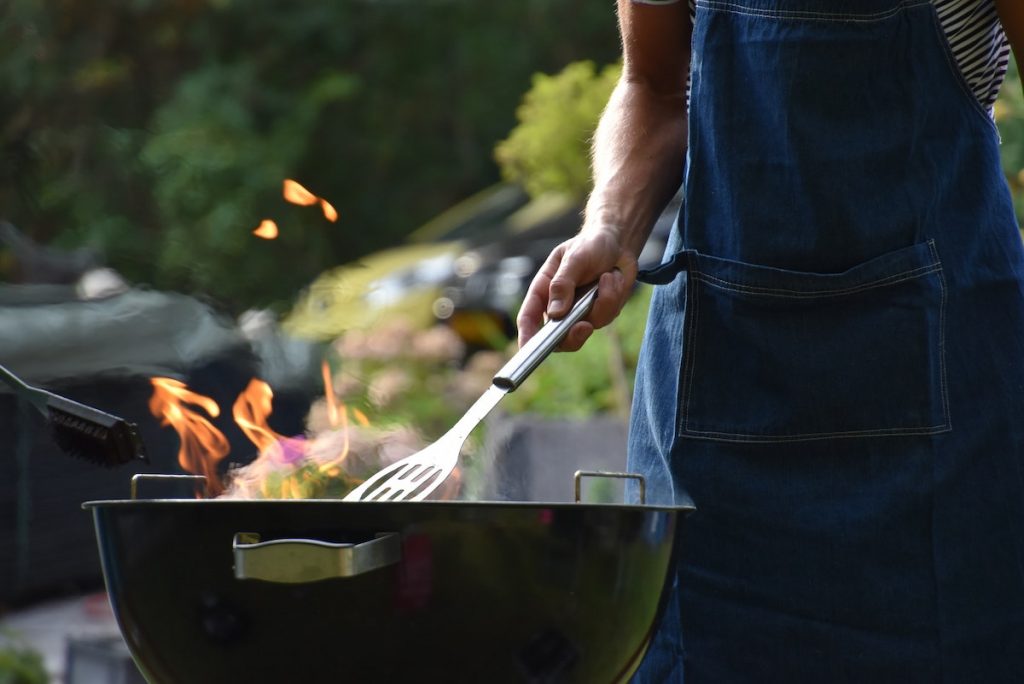Start…your…grills! But first, consult your community grill rules to make sure your grilling is in compliance with the fire code and community regulations so everyone stays safe.
I live in a condominium. There are five units in each building; the units are built on top of one another. I live on the third floor. We all just received a memo from the Board of Directors telling us that we cannot use gas or charcoal grills on our patios…something about a new state law. Is that right?
While the regulation is not brand new (it has been in effect since 1999), it is becoming more known because structural fires caused by “grills” are at an all-time high. As a result, virtually every state’s fire code now regulates cooking over an open flame. The Rules and Regulations for the State Minimum Fire Safety Standards for the State of Georgia (“Rules and Regulations”) establish minimum fire safety standards for the State. The Rules and Regulations include provisions of several other fire codes including the International Fire Code (“IFC”). The IFC specifically provides for regulation of charcoal and gas grills.
The IFC expressly prohibits the operation of charcoal and gas grill devices on “combustible balconies” or “within ten (10’) feet of combustible construction.” The provision applies to all dwellings except one-and two-family dwellings, so it applies to townhouses, condominiums, and all apartments.
As with any regulation, the IFC contains an exception to the rule. Charcoal burners and other open-flame cooking devices can be used on a balcony or within ten feet (10’) of a building where a building, balcony, or deck is protected by an automatic sprinkler system. However, an engineer with the Assistant Fire Marshall’s office has informed our office in the past that it is their offices’ opinion that the exception does not apply where combustible materials such as walls, carpeting, or hardwood flooring are located within ten feet (10’) of a patio, balcony, or deck. So, that means you cannot use your grill on your balcony without violating the community grill rules & regulations.
You should also know that the regulation also addresses the storage of charcoal and propane tanks. Charcoal can be stored on a balcony, but any other fuel source (i.e., propane tank, etc.) must be removed from the grill AND stored in a separate location. The State has very detailed requirements for storage of petroleum tanks, including that in most situations, tanks must be stored in a detached, fire-rated storage building. In most communities, this means that unless the community has a separate fire-rated storage building for gas tanks, you will not be able to keep gas tanks at the property.
As you can see, the regulation has the potential effect of prohibiting the use of a charcoal or gas grill on any balcony or patio. Community grill rules specify grills can only be used legally if they are located at least 10 feet away from your building. That means that while you can store your grill and charcoal on your balcony, you must move the grill to a location at least 10-feet away from the building before you can use it.
Any person who violates the regulation is subject to fines or other penalties. It is our understanding, however, that neither the State Fire Marshall’s office nor local fire departments have any intention of inspecting buildings for violations. Rather, if a violation is discovered while responding to a structural fire, then sanctions can be imposed.
Local Codes
As with the state, local governments can further limit how owners use open flames and combustible materials. It is best to be mindful of local rules surrounding grilling fuels, portable cookware, and smoke/exhaust fumes before starting up the barbecue. For example, the City of Atlanta regulates the use of portable outdoor fireplaces. Under this code, fire pits must meet and be operated according to the following:
- (1) The fuel size cannot exceed 2 feet by 3 feet.
- (2) The fire pit must have screening on all sides and the top.
- (3) The fire must be constantly attended.
- (4) The fire must be completely extinguished after use.
- (5) If there is objectionable smoke, the fire must be extinguished.
- (6) If wind direction causes the smoke to invade neighboring structures, the fire Shall be extinguished.
- (7) Fire extinguishing mediums must be provided, such as an appropriate fire extinguisher, a garden hose, dirt, or sand.
- (8) Fire pits must not be located within 15 feet of a structure.(9) Wood must be clean and without creosote. No construction materials or trash can be burned.
The warm weather, longer days, and summer holidays encourage people to enjoy “firing up the grill”. Whether it is just a dinner or a full-fledged barbeque, there is something special about cooking over an open flame. Unfortunately, that enjoyment can quickly turn into a tragedy if a multi-family building catches fire. The regulation is intended to prevent such tragedies from occurring.
If you have questions about the regulation and its enforcement, you may contact the Office of Insurance and Fire Safety Commissioner at (404) 656-2070 for further information.
Additionally, If you’re curious about other common area amenities and regulations in your community, such as swimming pool rules, you can also review the “Swimming Pool Rules and Regulations for HOA” as an additional resource provided by NowackHoward. It is important to familiarize yourself with these guidelines to ensure everyone’s safety and enjoyment of the facilities.


